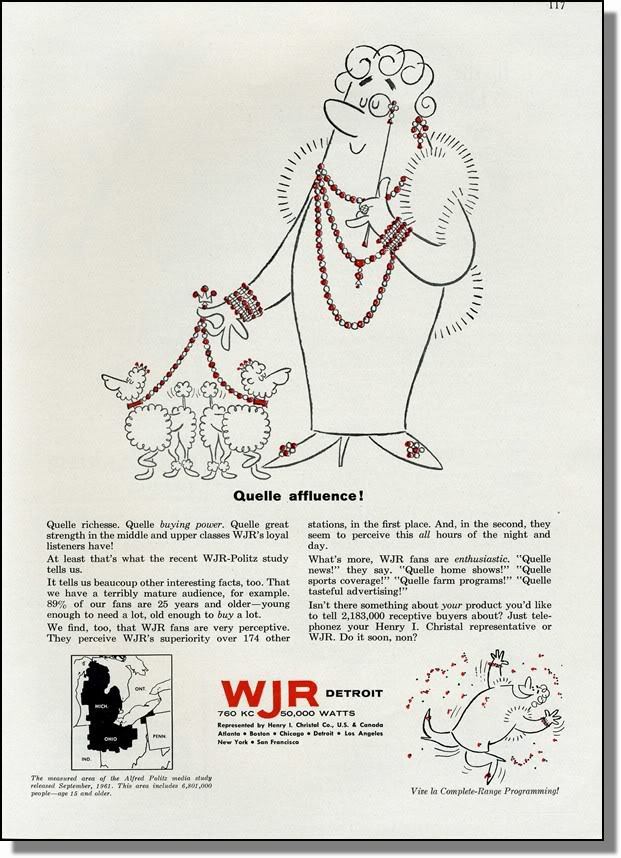 WJR Detroit 760 KC 50,000 WATTS
WJR Detroit 760 KC 50,000 WATTS
![]()
MCRFB note: Michael Patrick Shiels was the long-time producer for WJR Detroit’s legendary radio host, J.P. McCarthy. While on WJIM, Lansing, Michael Patrick paid homage to his radio hero/mentor J. P. McCartney on his program every August 16, which marked the day of the legendary WJR broadcaster’s passing back in 1995.
![]()
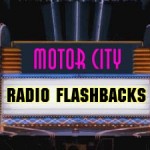 NEW! Added to the MCRFB archive:
NEW! Added to the MCRFB archive:
The Detroit Magazine, December 4, 1966
“Hello! Yeah, Bill. Bill, I’ll tell you what, the way the schedule is going, I just don’t see how I’ll be able to do it. Oh boy, I’m up to my ears, Bill. The idea sounded like it had a lot of appeal a few months ago, but I wasn’t busy a few months ago! Yeah, I’m very busy, and there’s no point in me kidding you about it. I’m very flattered you’re interested, but I think I’d better pass on it. Fine, Bill. Good to talk to you!”
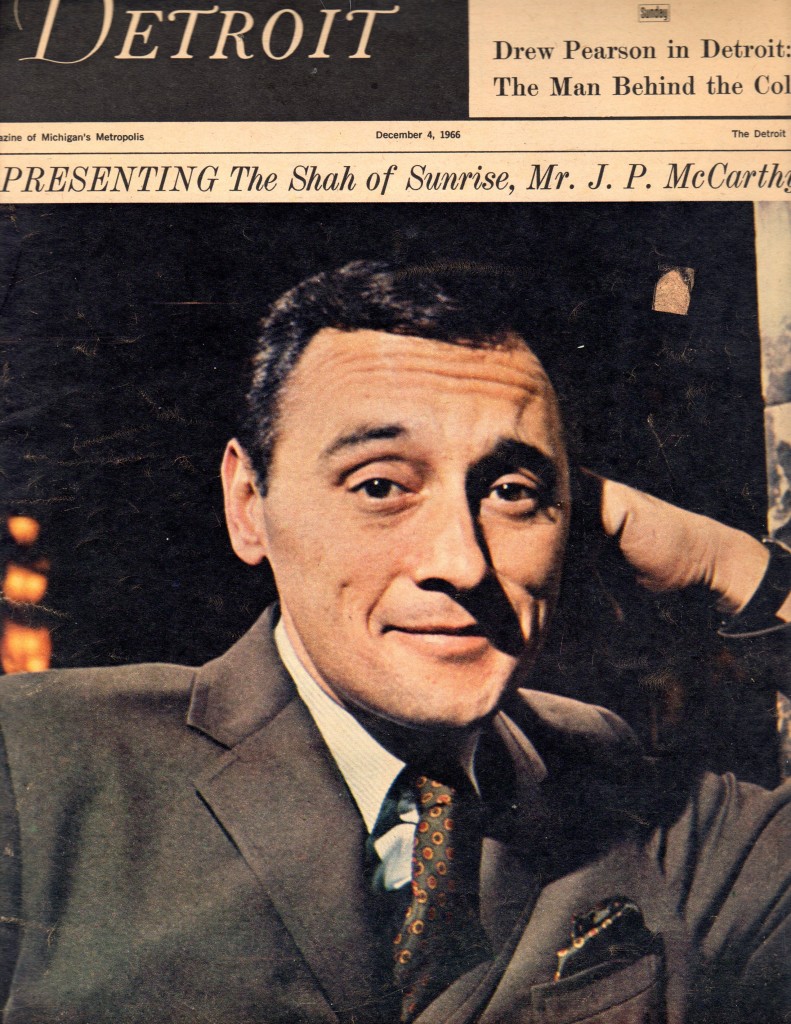
“Helen, get us some coffee, huh?” J. P. McCarthy leaned back in a swivel chair jammed into one corner of his cluttered office in WJR’s Golden Tower of the Fisher Building.
“Well, how serious can you get about a disc jockey program? I don’t even like the word disc jockey, but that’s what I am. I play records and talk to people, and I don’t think you can take yourself seriously when you’re doing something like that. I’d much rather be president of General Motors, or a neurosurgeon, but my hands aren’t steady enough.”
McCarthy (his friends call him Joe) laughed and said, “I guess I’d like to be a singer, but you know! I kinda sing on the air, after a fashion. Bill Kennedy says it makes him sick. I can drive cows out of their minds. Dogs are supposed to actually cover their ears with their paws when I sing! I’m gonna play my record tomorrow — ‘When Flying Tigers Play!’ I made it last year. Do you want to hear it? I’ll play it for you now if you really want to hear it, but not many people do!
“If I had my choice? I’d like to be president of General Motors. Yes, I’d like that a lot!”
Human nature being what it is, the president of General Motors might likely be only too happy to trade places with Joseph Priestly McCartney, WJR disc jockey, MC of the ‘Focus’ show, voice of numerous radio and television commercials, and star of a projected daytime TV interview show. It’s questionable, though, whether the president of General Motors would stand the gaff, and as for McCarthy’s being a neurosurgeon, well, medicine’s loss is the radio listener’s gain.
McCarthy’s voice, trained to be rich and resonant, is the commodity he markets with marked success. He’s the voice of The Great Voice of the Great Lakes, and he exudes Good Will. To the 21-and-up age segment of the radio listening public, J. P. McCarthy is the perfect image: Not way out, but buoyantly on top of the world; not a hipster, but “In”; not a clown, but playful; not brazen, but breezy.
Jockeying records, reporting on the conditions of”our beloved ditches,” his voice registers cynicism, delight, boredom, brashness, fatalism, impertinence, sophistication, world-weariness — a bagful of emotions and attitudes that his listeners may privately share but rarely publicly express.
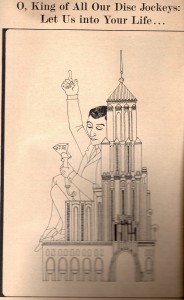
When McCarthy starts off his early morning “Music Hall” record show with the flip-remark: “Okay. Let’s get this turkey on the road!” early risers feel a little glow of ‘what-the-hellism’ beginning to warm the prospect of the day ahead.
McCarthy tosses commercials, platters, sports reports and weather news about his head with the competence and confidence of a four-armed, hind-sighted juggler. Businessmen who tune in are made to feel that here’s someone who can thumb his nose at convention and be his own boss. McCarthy’s young-mature listeners identify with his smoothness, his air of “in.”
They can quote J. P. ‘s ‘Winner Of The Day,’ sometime sympathize with his Loser of the Day. They always that though their own 9-to-5 existence may dissolve into drabness when the office floor or the kitchen door closes behind them, J. P.McCartney, their friend, will go through the rest of the day — and probably half the night — smiling, ridiculing, joke cracking; urbane and sophisticated; impervious to dullness, to mediocrity.
“Dr. Smith (Helen, could we have more coffee?) J. P. McCartney. Of the ‘Focus’ show on WJR. Doctor, I wanted to know if you could spare the time to come up here and talk about LSD some day. I’d really appreciate it.I think the maximum would be 12 to 15 minutes. Well, why don’t we do a program on it at your convenience? You set a date and we’ll devote as much time as we can to talking about it. Thank you. Good to talk to you.”
He has, in addition to “Focus,” the 6 to 9 morning “Music Hall.” Jimmy Launce, formerly on “Focus,” took over the afternoon “Music Hall” last spring.
“The idea,” McCarthy said, “was to give me more free time in the afternoons, but it hasn’t exactly worked out that way. A couple of weeks ago I flew out to the coast to make a pilot film for a national daytime television interview show. If it goes, it’ll be great. It’ll be fun. But I can’t . . . I’m not allowing myself to get excited, because I suppose for every 50 pilot films, one makes it. But they seem pretty excited. The nicest thing about it is that if it goes, I won’t have to leave here, because we do all our shooting on weekends on the coast. It would mean I’d be commuting.”
McCarthy already has a schedule that would give the president of General Motors pause.
By 9 in the morning, when most businessmen are just checking into the office, McCarthy has already put in three hours on his record show. He breakfasts on the run, and spends a good part of the late morning lining up records, interviews and reports for the next day’s session at the turntable.
Around 11 a.m. each day, the “Focus” producer comes in for a rundown on the day’s show.
Producer: Let’s go over the lineup for today’s show, Joe.
McCarthy: Good! Want some coffee? Who’s on today, anyway? I don’t even know who’s going to be here!
Producer: We’re having a manufacturer’s rep, who’s goin to explain what he does,and talk about business ethics.
McCarthy: That’ll be something! Business ethics. Any body else?
— Audra Hendrickson
_______________________________________________________________________________________
Audra Hendrickson lives in Bloomfield Hills and is an occasional contributor to DETROIT magazine. (DETROIT magazine; December 4, 1966)
_______________________________________________________________________________________
Addendum: Motor City Radio Flashbacks would like to extend special thanks to our website contributor James Heddle for providing us this special J. P. McCarthy article. From the James Heddle Collection.
![]()
![]()
Billboard Magazine; March 2, 1963
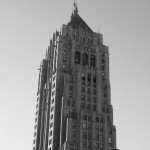
DETROIT — Deejays are competitive, but they can also be cooperative.
While recuperating from a knee twist which had him away from the WJR studio turntables for about a week, midnight record-spinner Jay Roberts received a note from station owner Jon Holiday, of WAIR (Winston-Salem) asking permission to use the basic format of Roberts’ “Nightflight 760.”
Roberts simulates a jet flight to a different city every night, beginning with a whooshing takeoff sound effect and a (pre-recorded) airline hostesses’ voice issuing a welcome and instructions just as though it was a real flight. During the flight, “Captain” Roberts describes the city of the night in detail.
Roberts told Holiday, a former top jazz deejay from Little Rock, Arkansas to go ahead. END
___
(Information and news source: Billboard; March 2, 1963)
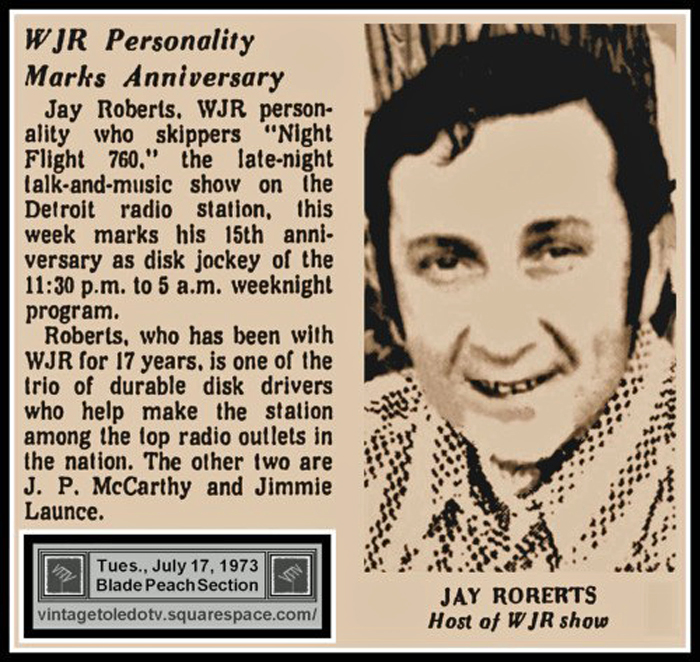
![]()